Published 1 February 2021 ● Last Updated on 2 February 2021
Be it stale bread, blemished fruits or over-ripe tomatoes, the amount of food we throw away without a second thought is unbelievable. UN’s World Food Programme (WFP) estimates that one-third of the 4 billion metric tons of food we produce each year is lost or wasted, costing the global economy nearly US$1 trillion annually. As for our Singapore, despite the food security challenges we face, food waste generated has grown by 20% over the last decade standing at 744 million kg in 2019- an amount enough to feed two bowls of rice per day per person! Besides being a colossal waste there are serious environmental repercussions to consider too. When we waste food, all the energy and water put into growing, harvesting, transporting and packaging it goes to waste too. If land-filled, the rot produces methane- a greenhouse gas even more potent than carbon dioxide. If incinerated, food waste isn’t an efficient fuel, since 70% of food is water and the net energy gained in the process is very low or negligible.
Thankfully, entrepreneurs across the globe have come up with some innovative food waste initiatives turning what many consider trash into delicious and nutritious products. Some companies have found ways to upcycle food waste to transform it into new products. Others are innovating management processes. Read on for a sneak peek into the game changers, with a special spotlight to our home-grown businesses fighting food waste in Singapore:
Companies keeping our landfills light
UglyFood
Founded in 2016, Singapore-based UglyFood sources “ugly” aka non-standard and surplus produce that’s destined for the landfill from suppliers that can’t wait to sell. The produce is resold at a high discount, usually as-is, or in some cases via a transformation into popsicles, juices and dessert bowls. UglyFood’s efforts to create a sustainable food system have saved 120 tonnes (and counting) of food from ending up in the garbage bin in just 2 years. So the next time you want delicious fruits and veggies at reasonable prices in Singapore, check out their online store. Yes, they do have home delivery!
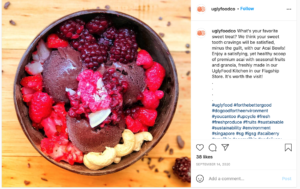
Treatsure
A common incident of food wastage at home (we are all guilty of binning seemingly stale food) led to the creation of Treatsure. The company’s win-win proposition is a mobile app connecting businesses and hotels with excess food to customers who are looking for value deals. The platform allows consumers to dig into some prime buffets with deals as low as $10 per box. It also features an array of grocery suppliers, so consumers can purchase perfectly edible near-expiry or blemished food items.
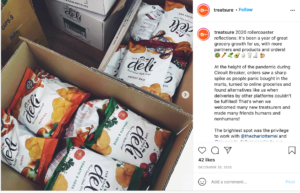
TreeDots
TreeDots is a social enterprise which connects unsold food inventory (be it food considered too ugly/non-standard for consumption, or too close to expiry) and buyers willing to buy them at discounted prices. Its product range includes a variety of seafood and meats – and you are possibly imagining that best-by dates are a prime driver behind this company’s business model. But it’s also consumer choices – such as the preferences for fillet cuts of fish… while the piling fish heads and fish bellies have few takers! TreeDots started by supplying the “rescued” food to restaurants and businesses, and has now expanded its reach in the past year to individual buyers by offering group-buys. If you are looking for steal deals and are willing to pool in orders – look up their app for households.
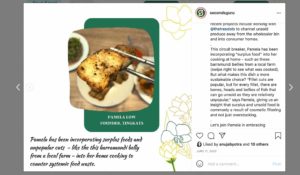
Karma
Similar to the start-ups listed above, Swedish start-up Karma asks what if we “ate the problem” of food waste, and connects surplus foods to household buyers. Its app connects businesses – cafes, restaurants and grocery stores – to consumers who want great food at low prices. Karma box, their special offering, allows subscribers to choose and enjoy some great produce – fruits and vegetables as well as branded products – delivered to their doorstep weekly. A perfect food waste initiative that marries convenience and smart technology, Karma has grown to a base of 1.4mn users in 225 cities, spread across Sweden, UK and France.

Too Good To Go
Too Good To Go aims to be more than just an app channelizing excess food to conscious consumers via value deals; it is a community of waste warriors fighting food waste. Their ambition is to go beyond households and business enterprises and rope in other avenues for food waste reduction such as education at schools and participation in public affairs.
Companies upcycling discards and ‘ugly food’ to make something new
Rubies in the Rubble
Food waste is an issue that exists throughout the food supply chain- at farms, during storage and distribution, at supermarkets and in households. Founded in 2012, UK based Rubies in the Rubble targets the entire food supply chain to rescue food that is rejected just because it doesn’t look perfect to create award winning ketchups, mayos and many more delicious condiments.
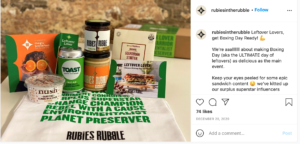
CRUST Group
Singapore-based CRUST Group tackles food waste by upcycling surplus ingredients like bread and waste like fruit peels into beverages. They brew craft beers under the ‘Crust’ brand and other non-alcoholic beverages under the ‘Crop’ brand. Through their mission #savecrust the company aims to reduce global food loss by 1% by 2030!
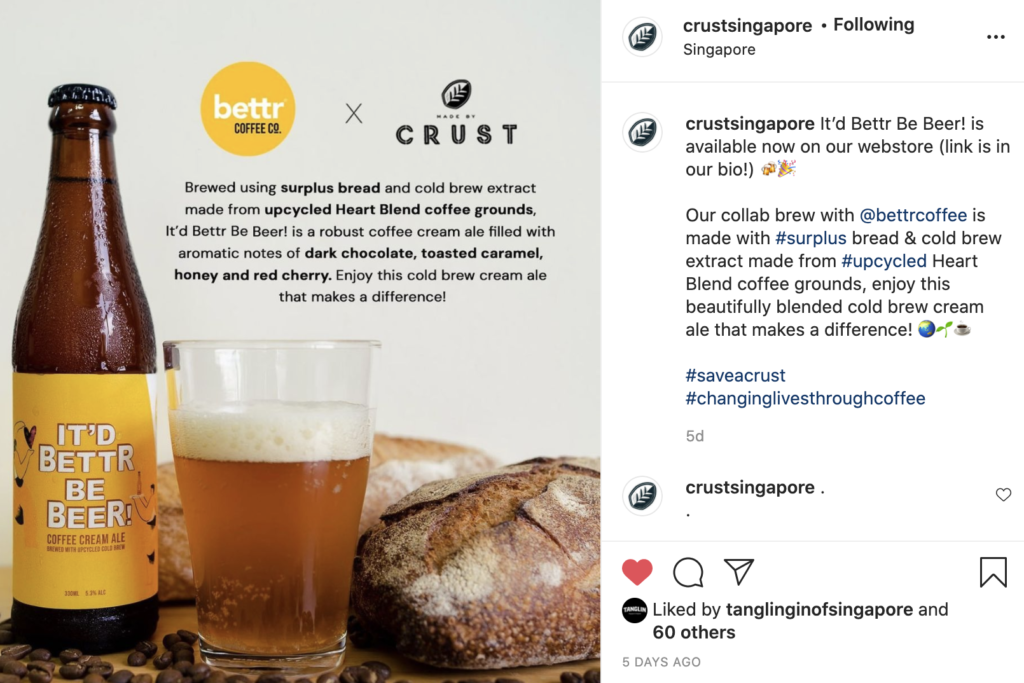
Biopak
Feels strange to put a disposables-producing company on our list – but Biopak finds a place on this list thanks to its product Biocane – a material made from bagasse. Bagasse is the fibre that remains after the juice has been extracted from the sugarcane plant – it is a readily available agricultural waste. Via Biocane, the company aims to meet the needs of food businesses that find single-use packaging unavoidable. Its plus points are that it is home compostable and not derived from trees nor fossil fuels.
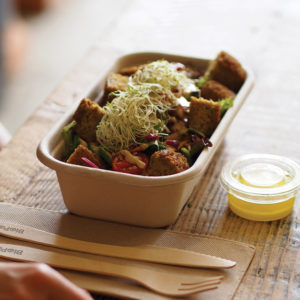
Companies making food live longer
Apeel Sciences
Founded in 2012, Apeel Sciences offers an innovative technological solution to retain the natural freshness of fruits and vegetables – this translates into longer life and reduced food wastage. The company produces and adds a layer of tasteless, odorless, plant-based coating on the surface of fruits and vegetables which helps keep moisture in and oxygen out, making them last as much as four times as long! By extending the shelf life of produce, the US-based company has reduced food waste in the farm-to-table process – be it the spoilage during the import process or on supermarket shelves.
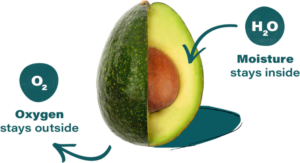
Companies tracking and managing food waste
Winnow
With its cutting-edge AI technology, Winnow helps large kitchens ( including IKEA!) tackle the challenge of food waste by capturing images, tracking and recording data of food which gets trashed in bins. By recognising and segregating different trash components like meat and vegetables and putting a qualitative value to it, professional kitchens get a clearer insight on how to manage their menu and purchase decisions, ultimately not only reducing waste but also cutting their cost and improving their operational efficiency.
Lumitics
“How can a kitchen reduce its food waste if it does not even know what is thrown away, how much is thrown away and when this waste is being generated?” An excellent question with which Singapore based Lumitics’ flagship solution introduces Insight-a food waste management solution which helps restaurants and kitchens identify and weigh exactly that. Lumitics’s food waste tracker uses sensors and a proprietary image recognition technology to generate data which helps hospitality and food and beverage businesses cut down food waste and cost.
While both Winnow and Lumitics try to tackle the problem of food waste with data, the technology used is slightly different– Winnow users need a separate bin, scale and tablet device, whereas, Lumitics offers a one-fit solution for existing bins in kitchens.
Few final words
Households in Singapore alone throw away 26000 tonnes of unconsumed food annually; extrapolate this number at a global level and the result is waste at unimaginable levels. It’s heartening to see entrepreneurs world over committed to the cause of food waste; but much like charity, fighting for this sustainability goal too must begin with small changes in our own homes for a quicker solution.
Cover image credit: Photo by Joshua Hoehne on Unsplash
Related topics:
Food waste | The Singapore story and what you can do to help reduce it!
Fruit Rescue | Tasty and creative ways to reuse those “waste” orange peels


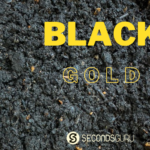
0 Comments